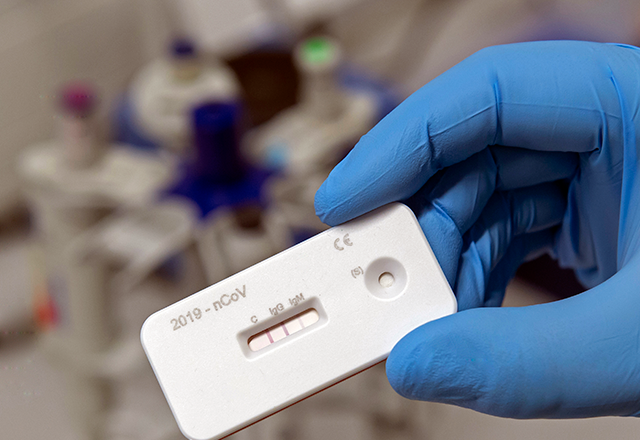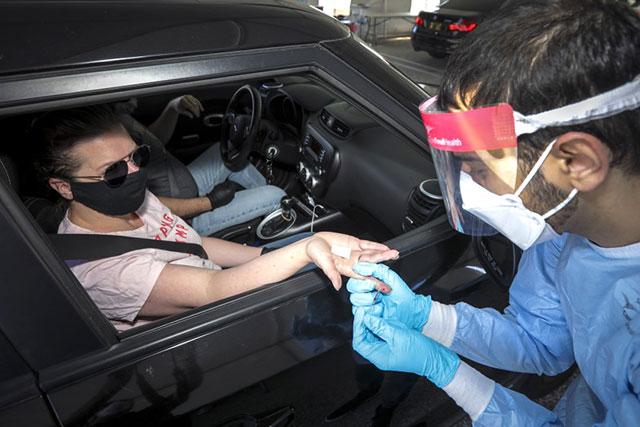You are here
Antibody testing for COVID-19 is key to taming the pandemic
By Chicago Tribune (TNS) - Apr 15,2020 - Last updated at Apr 15,2020

AFP photo
CHICAGO — To determine when Americans can safely venture out of their home bunkers, scientists must first understand who has already contracted the new coronavirus that causes COVID-19.
Nasal swab tests can detect the active virus, but the lack of widespread testing in the United States to date has left scientists with only a fraction of the information they need to understand the scope of the pandemic. Getting the full picture, they say, will require a reliable test that can detect antibodies to the virus in people’s blood.
The blood tests — which doctors call serology tests — may ultimately answer the questions needed to contain the pandemic and set the nation on a path toward normalcy: How many people have recovered from the disease without ever being tested? How common is it to have the disease without suffering symptoms? Can a person with antibodies safely return to work without fear of infecting others — or being reinfected?
With these urgent questions looming, the Food and Drug Administration has allowed scores of serology tests onto the market without the usual approval process, provided they met certain criteria. But doctors and public health officials say the result is a dizzying array of test options and uncertainty about their accuracy.
The FDA has given emergency approval to one company’s serology test, strictly for laboratory use in helping to diagnose COVID-19 cases. “The results obtained with this test should only be interpreted in conjunction with clinical findings, and the results from other laboratory tests and evaluations,” the FDA stated in its notice on the Cellex test.
Dr Stephen Hahn, commissioner of the FDA, spoke over the weekend about the importance of serology tests, which he called “one of the keys” to managing the pandemic, while also expressing concerns about the accuracy of tests not yet approved by his agency.
“I am concerned that some of the antibody tests that are in the market that haven’t gone through the FDA scientific review may not be as accurate as we’d like them to be,” Hahn said on ABC’s “This Week” news show. “No test is 100 per cent perfect. But what we don’t want are wildly inaccurate tests. Because, as I said before, that’s going to be much worse.”
In Chicago, Public Health Commissioner Allison Arwady said last weekend that a serology test her department was using had a higher rate of false negatives and positives than the nasal swab tests it also uses. The health department did not respond to questions about which blood test that was.
But, as she has before, Arwady stressed the essential nature of serology tests to taming the pandemic, saying they are “such an important thing.” She added that she was anxious to see which tests the FDA would eventually clear for use.
Dr Anthony Fauci, the federal government’s point person on the pandemic, told The Associated Press that most of the serology tests on the market have not been proved to work well. The infectious disease chief at the National Institutes of Health, Fauci said his staff is working with the FDA to validate the tests.
Some local institutions are already using the tests for diagnostic purposes. At a drive-up testing facility set up at Roseland Community Hospital on Chicago’s South Side, hundreds of people a day are getting the nasal swab, a blood test or both, said Dr Terrill Applewhite, chairman of the hospital’s COVID-19 task force.
Applewhite said he’s confident in the accuracy of the test the hospital is using.
With the goal of understanding the true scope of the pandemic, the National Institutes of Health has developed an in-house test that scientists plan to use as part of a new study announced last week. The study’s main objective is to determine how widespread the disease is and which communities have been hit hardest.
Part of the inquiry will involve trying to ascertain what percentage of the population that contracted the virus never got sick, a phenomenon that was discovered through previous testing.
People infected but free of symptoms were found on cruise ships, living in Italy and playing for the NBA. But just how many of those fortunate people exist is not known, and scientists are trying to pinpoint the real number. It’s a key question, given that asymptomatic patients may be silent spreaders of the virus.
The study involves collecting up to 10,000 blood samples from adult volunteers who don’t have COVID-19 symptoms and were not previously diagnosed with the disease. The blood will be collected either at designated labs or through mail-in kits.
Similar smaller studies exist but are not sufficient to give scientists a complete picture of the pandemic here in the United States, said Kaitlyn Sadtler, chief of immuno-engineering at NIH’s National Institute of Biomedical Imaging and Bioengineering.
The data from the NIH study will be combined over time with that from other research projects, Sadtler said. “This will be a giant team effort, with all scientists across the country,” she said.
Gigi Gronvall, a senior scholar at Johns Hopkins Centre for Health Security, said her institution is advocating for widespread use of antibody tests as part of a broader strategy to fully understand, manage and eventually end the pandemic.
“There’s a lot we need to know about this disease, so finding the prevalence in the population will be a big deal to [help people] know where you are more or less at risk, more or less likely to bump into someone who is infected,” she said. The testing, she added, also will be “part of a larger strategy for how people will go back to work and so forth.”
Gronvall said serology testing also could eventually answer trickier questions, such as what level of antibodies a person needs to be protected and how long those antibodies last.
“This is a new virus,” Gronvall noted. “We don’t know exactly what level of immunity you would need to protect against this infection. … Probably people who have had it are going to be immune for some time, but we don’t know what the expiration date is on immunity. And it’ll probably be different for different people, but we don’t know the range.”
In addition, Gronvall said, identifying antibodies that ably neutralise the virus could help lead to treatments or, ideally, a vaccine.
But, for now, the testing is being done mostly in an effort to understand the scope of the pandemic and help determine when it’s safe for people to venture out — at least until there’s a more sweeping solution.
“The best solution here is going to be a vaccine… and so whatever we can do to test as many people until that time comes is a bridge,” Gronvall said.
Doctors on the ground say they are eager for the day when the FDA certifies the accuracy of tests that can be widely used. Part of the attraction is that serology tests are less expensive and simpler to process than the nasal swab tests.
“It’s a fairly cheap test, which is good, and it will tell you if you have you antibodies to the coronavirus, and that’s a very helpful piece of information,” said Dr Rahul Khare, founder and CEO of Innovative Express Care, an immediate care facility on the North Side. “I think there’s going to be, in late May or June, two types of people: those who have been exposed and are immune and those who have not who may get it.
“What we really want to know is of the people who have chronic conditions, who are elderly — have they gotten it and do they have to be extremely careful until there’s a way they can get antibodies to this somehow — be it by vaccine, be it by plasma transfusion — we don’t know yet,” he added. “But there will hopefully be a mechanism to develop those antibodies so the reaction of the body won’t be so great, causing all these illnesses that we’re seeing.”
Related Articles
LOS ANGELES — At a flotation therapy studio in Marina Del Rey, California, the sensory deprivation tank is empty, but antibody tests for the
ROME — Italy began conducting antibody tests in the northern region of Lombardy on Thursday, seeking information about coronavirus immunity
For months, Vanderbilt University researcher Dr James Crowe has been desperately seeking access to the blood of US Ebola survivors, hoping to extract the proteins that helped them overcome the deadly virus for use in new, potent drugs.

















